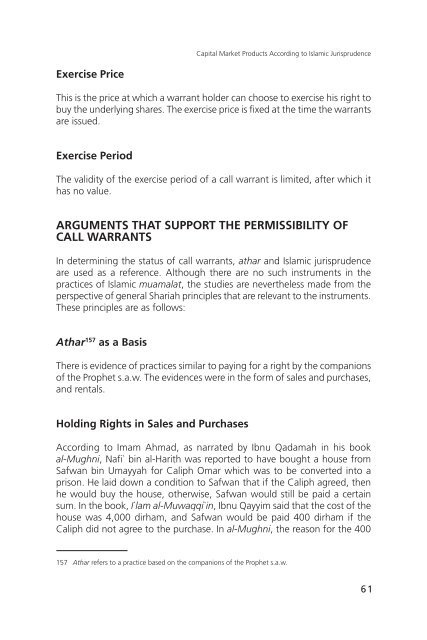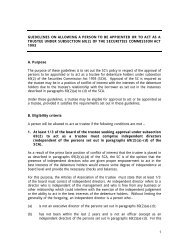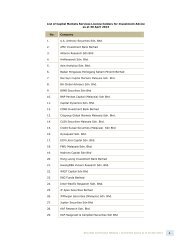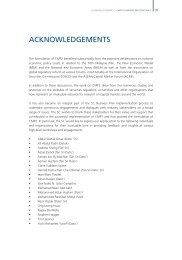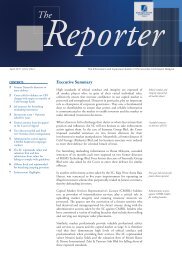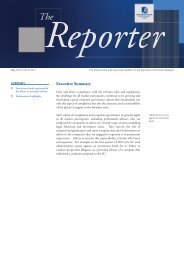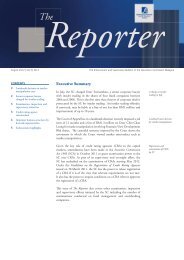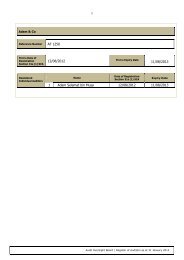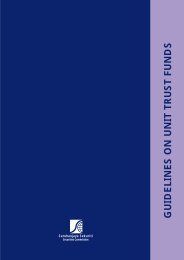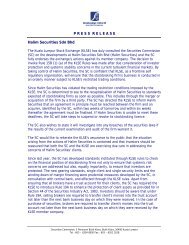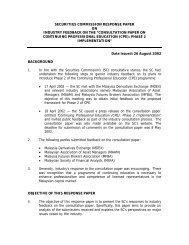Resolutions of the Securities Commission Shariah Advisory Council
Resolutions of the Securities Commission Shariah Advisory Council
Resolutions of the Securities Commission Shariah Advisory Council
You also want an ePaper? Increase the reach of your titles
YUMPU automatically turns print PDFs into web optimized ePapers that Google loves.
Exercise Price<br />
Capital Market Products According to Islamic Jurisprudence<br />
This is <strong>the</strong> price at which a warrant holder can choose to exercise his right to<br />
buy <strong>the</strong> underlying shares. The exercise price is fixed at <strong>the</strong> time <strong>the</strong> warrants<br />
are issued.<br />
Exercise Period<br />
The validity <strong>of</strong> <strong>the</strong> exercise period <strong>of</strong> a call warrant is limited, after which it<br />
has no value.<br />
ARGUMENTS THAT SUPPORT THE PERMISSIBILITY OF<br />
CALL WARRANTS<br />
In determining <strong>the</strong> status <strong>of</strong> call warrants, athar and Islamic jurisprudence<br />
are used as a reference. Although <strong>the</strong>re are no such instruments in <strong>the</strong><br />
practices <strong>of</strong> Islamic muamalat, <strong>the</strong> studies are never<strong>the</strong>less made from <strong>the</strong><br />
perspective <strong>of</strong> general <strong>Shariah</strong> principles that are relevant to <strong>the</strong> instruments.<br />
These principles are as follows:<br />
Athar 157 as a Basis<br />
There is evidence <strong>of</strong> practices similar to paying for a right by <strong>the</strong> companions<br />
<strong>of</strong> <strong>the</strong> Prophet s.a.w. The evidences were in <strong>the</strong> form <strong>of</strong> sales and purchases,<br />
and rentals.<br />
Holding Rights in Sales and Purchases<br />
According to Imam Ahmad, as narrated by Ibnu Qadamah in his book<br />
al-Mughni, Nafi` bin al-Harith was reported to have bought a house from<br />
Safwan bin Umayyah for Caliph Omar which was to be converted into a<br />
prison. He laid down a condition to Safwan that if <strong>the</strong> Caliph agreed, <strong>the</strong>n<br />
he would buy <strong>the</strong> house, o<strong>the</strong>rwise, Safwan would still be paid a certain<br />
sum. In <strong>the</strong> book, I`lam al-Muwaqqi`in, Ibnu Qayyim said that <strong>the</strong> cost <strong>of</strong> <strong>the</strong><br />
house was 4,000 dirham, and Safwan would be paid 400 dirham if <strong>the</strong><br />
Caliph did not agree to <strong>the</strong> purchase. In al-Mughni, <strong>the</strong> reason for <strong>the</strong> 400<br />
157 Athar refers to a practice based on <strong>the</strong> companions <strong>of</strong> <strong>the</strong> Prophet s.a.w.<br />
61


